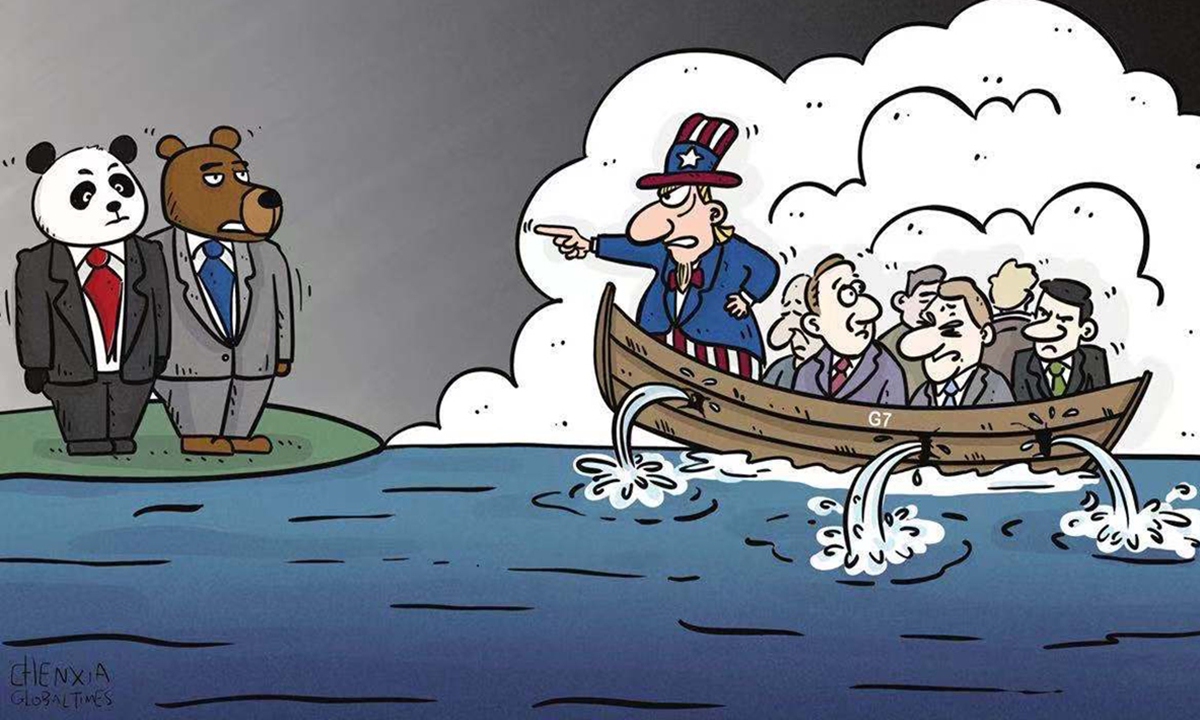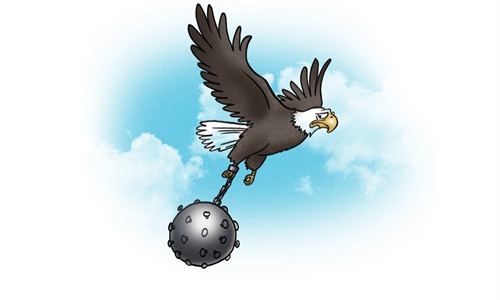
Illustration: Chen Xia/Global Times
While the existing global order is scarred and the US is incapable of sustaining it and it doesn't think about any reforming move, what should the US-led West do? Some Western elites have given their answer: Shifting the problem to the countries they do not like - China and Russia.A recent article in the Financial Times has taken advantage of the Russia-US tensions over Ukraine and laboriously included the Taiwan question, pointing the gun at Russia and China.
The article titled "Russia and China's plans for a new world order" unsurprisingly portrayed Russia and China as the "villains", suggesting that the two countries' ideas go against so-called universal values. The article read, "While the western liberal tradition promotes the idea of universal human rights, Russian and Chinese thinkers make the argument that different cultural traditions and 'civilizations' should be allowed to develop in different ways."
Lü Xiang, a research fellow at the Chinese Academy of Social Sciences, told the Global Times that the Financial Times fundamentally represents the viewpoint of the elites of the US and the UK, whose ultimate goal is to overthrow Russia and China. They bring together totally irrelevant matters to create a narrative favorable for them.
The entanglement between Ukrainians and Russians dates back to Tsarist Russia, and, the Taiwan question is purely an internal matter of China stemming from the country's own history. If there is any similarity between the Ukraine tension and the Taiwan question, it is that they both have nothing to do with the world order.
"The Financial Times article links Ukraine and the island of Taiwan to world order in a far-fetched way because those Western elites see China and Russia as a thorn in their eyes: They cannot deal with the two countries at will as they do to others, so they start to smear them as destroying the world order," Lü said. "On the contrary, the ever closer relationship and bond between China and Russia is the last defense that protects the world order."
The Financial Times article's far-fetched argument is naturally contradicting itself. For example, it says the crisis over Ukraine is a struggle over the future of the world order, because, "For the US, these [Russia's] demands violate some basic principles of the current world order - in particular, the right of an independent country to define its own foreign policy and strategic choices."
Isn't China and Russia's idea that different civilizations should be allowed to develop in different ways the practice of an independent country's right to define its own policy and strategic choices? Isn't the suppression of China and Russia's development a violation of those basic principles, according to the Financial Times?
Maybe this is the problem with the US-led old global order: The US-led West defines the world by its own standards, and then domineers and refuses to allow any move to seek common ground while reserving differences.
Threat from the US
The US' rise on the world stage was also a process of building an order globally. It has played the roles of both a hegemonic controller and a builder of the order. The liberal world order established after World War II has synergized with American hegemony to form a system at the service of the US.
But now, the US has gradually lost the strength to support that system, especially under former President Donald Trump's presidency. The US started to exhibit many symptoms of a failure to adapt to the liberal international order and Washington has tried to get out of its own box by placing the blame on China and Russia. However, more people have begun to realize that much of the damage to the world order is the job of the US.
Lü pointed out that the US is the biggest threat to the order it has built itself. For example, the world order principles are rarely taken into account when the US deals with the countries to its south.
"The US has a lot to be ashamed of in relations with its neighbors. Think about what it has done to Grenada. The international community blamed the US for that, but so what?" Lü noted. "And think Panama. The US instigated the independence of Panama just for the control of the Canal. And decades later, the US sent troops to Panama to take the country's president into US' prison who Washington didn't like."
Nevertheless, the US can no longer easily deceive people by propagating its so-called universal values. More people see the real political intention behind those values - because the universal values are not even universal within the US. Problems such as racial discrimination, labor-management confrontation, money politics, the gap between the rich and the poor, social fragmentation and insecure human rights have long existed and become increasingly serious in the US and some other Western countries. This stands in sharp contrast to the universal values they claim to uphold. The world order based on such values has long since fallen into disarray.
Some Western scholars didn't avoid admitting to this reality. As early as 2017, the Munich Security Report said frankly that the world is "on the brink of a post-Western age" as "Some of the most fundamental pillars of the West and of the liberal international order are weakening."
Shada Islam, director of Europe and geopolitics at Friends of Europe, a renowned and influential independent think tank based in Brussels, recently told the People's Daily in an interview that the threat to Western liberal democracy came from outside but now the biggest risk comes from within the Western society.
Reluctant to let go of hegemony
Five years have passed since the Munich Security Report 2017 was released, but the problems faced with the US-led West didn't lessen. However, their brazen approach to handling the problem is unmatched. They have come up with a self-deceiving ideological propaganda campaign of "democracy versus autocracy" in an attempt to distract people's attention. But such outdated tricks cannot hide the fact that the US' strength is waning, rapidly.
Those Western elites ignore the fact that reforming the world order is not just a demand of China, but appeal to most countries in the system.
Just as Professor Zheng Yongnian once said, "It is clear that in the system, the interests of some Western countries have been over-expressed, while the interests of developing countries, including China, have been far from fully expressed. This unbalanced power structure is the cause why the international system does not work well. One could therefore argue that reform is more than a requirement."
As more countries now become dissatisfied with the US and its hegemony, the world order will eventually go along the direction of reforms. The world longs for a world order that is more democratic with more consultations where more international organizations democratically participate so that different countries can play a more important role in the order.
Lü believes that with China and Russia as the defense, the world should go on this path in the future - and the US and some of its pawns will try to erect barriers to impede urgently needed reforms. "Despite that many Western countries are upset at the US, some of them fear the US may decline too fast and impacting their interests," Lü said.
A truly democratic international order must be one in which most global problems are resolved through consultation among the countries involved. "Take the pandemic that has lasted for two years. If there had been a global coordination mechanism from the beginning, the pandemic would not had been what it is today," Lü noted.
The author is a reporter with the Global Times. opinion@globaltimes.com.cn


